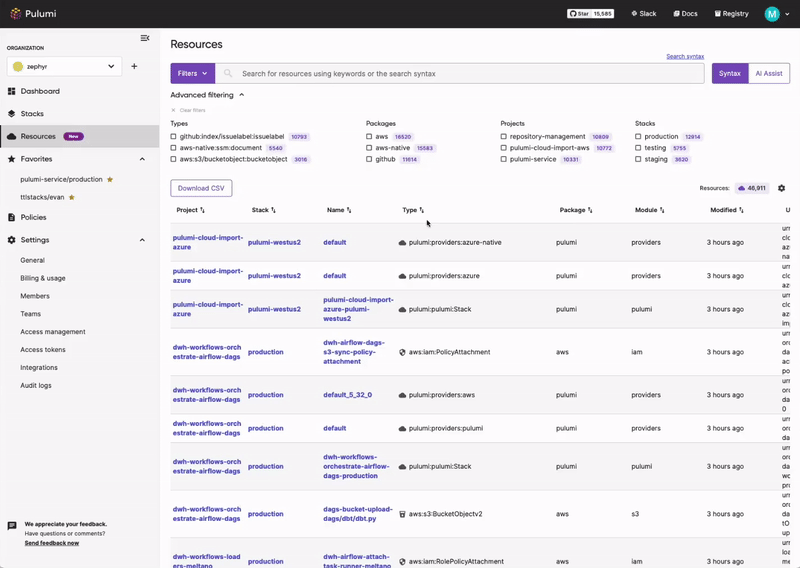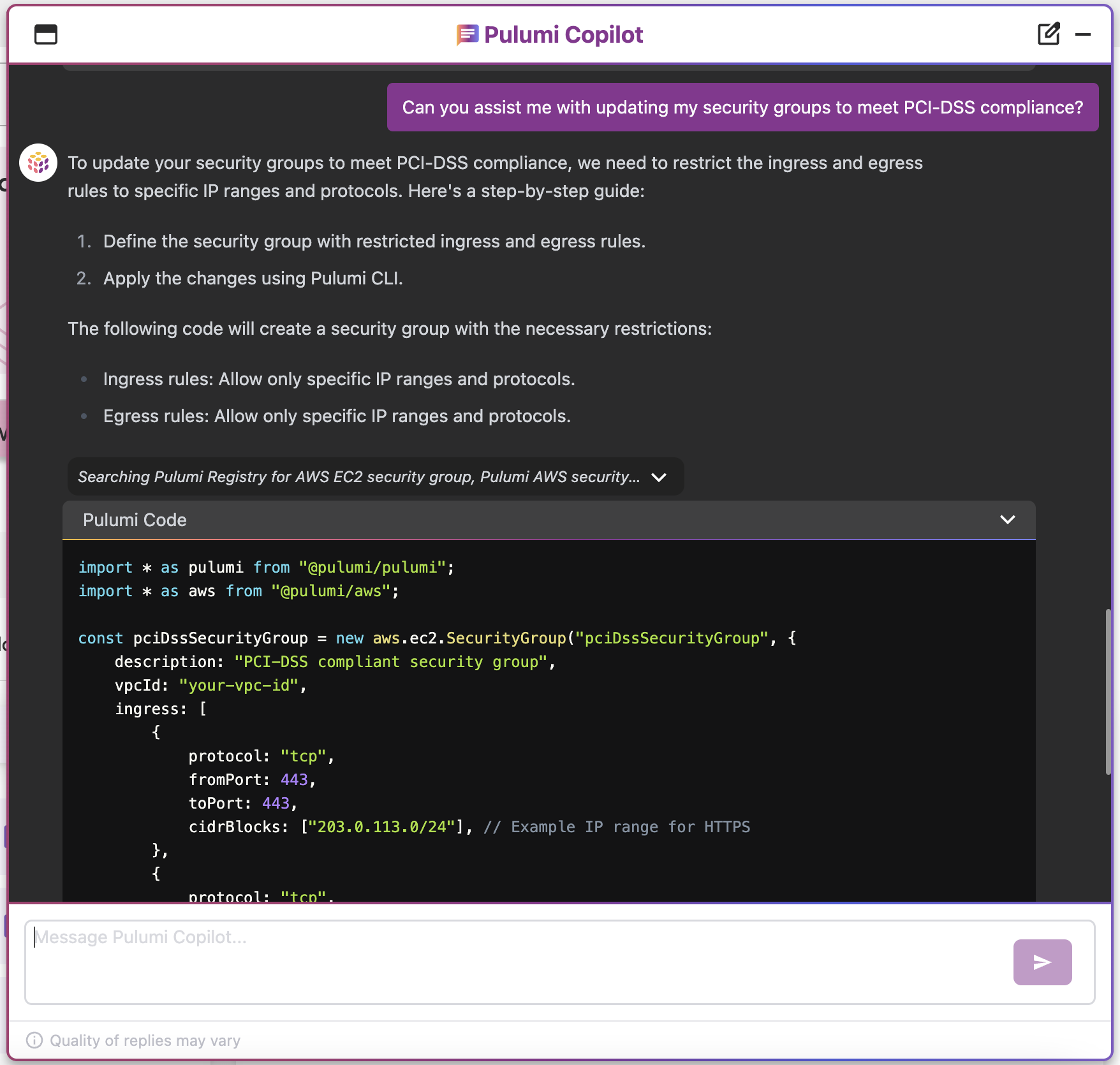Achieve ISO 27001 Compliance for Google Cloud Compute Engine
Achieve ISO 27001 Compliance for Google Cloud Compute Engine
ISO 27001 compliance is essential for ensuring the security and management of sensitive information across your organization. Pulumi can assist you in making your Google Cloud infrastructure ISO 27001 compliant. Pulumi can help you identify existing cloud resources that are not in compliance, and it can also enforce compliance policies proactively before infrastructure is deployed. Get started with Pulumi to use these compliance tools or speak with a Solutions Architect to get an expert consultation.
What is ISO 27001 Compliance?
ISO 27001 is an internationally recognized standard for establishing, implementing, maintaining, and continually improving an information security management system (ISMS). It helps organizations protect sensitive data by providing a risk-based approach, ensuring that security measures are proportionate to the risks faced. ISO 27001 is based around the following 3 pillars: confidentiality, integrity, and availability. By achieving ISO 27001 certification, organizations demonstrate their commitment to robust information security practices and regulatory compliance.
Key Aspects of ISO 27001 Compliance
- Risk Management: ISO 27001 requires organizations to assess risks related to their information assets and implement controls to mitigate these risks.
- Security Controls: The standard includes a comprehensive set of security controls (outlined in Annex A) that cover areas like access control, cryptography, physical security, and incident management.
- ISMS Implementation: Organizations must establish an ISMS, which is a systematic approach to managing sensitive company information so that it remains secure. This involves setting policies, procedures, and controls.
- Continuous Improvement: ISO 27001 emphasizes the importance of continually monitoring, reviewing, and improving the ISMS to adapt to changing security risks and business needs.
- Compliance and Certification: Organizations can seek certification to ISO 27001 by undergoing an external audit conducted by a certification body. Certification demonstrates that an organization has implemented best practices for information security management.
- Legal and Regulatory Requirements: ISO 27001 helps organizations comply with legal, regulatory, and contractual obligations related to information security.
Pulumi Insights
Use Pulumi Insights to gain visibility into your cloud infrastructure's configuration to assess ISO 27001 compliance. Pulumi Insights is Intelligent Cloud Management. It helps you gain security, compliance, and cost insights into the entirety of your organization's cloud assets and automatically remediate issues.

Pulumi Copilot
Use Pulumi Copilot to assist configuring your infrastructure to make it compliance ready. You can tap into the Pulumi Copilot's deep understanding of your organization's context to gain visibility into the configuration of resources and assess their compliance.

Compliance Ready Policies
With comprehensive coverage of Google Cloud, Pulumi Compliance Ready Policies provide an enhanced level of control and governance over your cloud resources. Pulumi Compliance Ready Policies empower you to enforce best practices, security standards, cost controls, and compliance requirements seamlessly within your infrastructure-as-code workflows.
What is Google Compute Engine?
Google Compute Engine provides scalable, high-performance virtual machines that run in Google's innovative data centers and worldwide fiber network. With a wide range of machine types, including predefined and custom options, users can optimize for compute, memory, or cost efficiency. Compute Engine offers features like live migration, automatic restart, and custom machine types, enabling users to run diverse workloads from micro-services to large-scale computational workloads.
What controls can I put in place to evaluate Google Compute Engine resources?
- Compute Engine disk snapshots should not be publicly restorable
- VPC default firewall rules should not allow inbound or outbound traffic
- Attached Compute Engine disks should be encrypted at rest
- Stopped Compute Engine instances should be removed after a specified time period
- Network security logging should be enabled for all VPCs
- Default encryption for Compute Engine disks should be enabled
- Compute Engine VMs should use Instance Metadata Service Version 2
- Compute Engine instances should not have a public IP address
- Compute Engine instances should be configured to use private VPC service connections
- Unused external IP addresses should be removed
- Firewall rules should not allow ingress from 0.0.0.0/0 to SSH port (22)
- Firewall rules should not allow ingress from 0.0.0.0/0 to RDP port (3389)
- VPCs should not automatically assign public IP addresses
- Unused firewall rules should be removed
- Compute Engine instances should not use multiple network interfaces (NICs)
- Firewall rules should only allow unrestricted incoming traffic for authorized ports
- Firewall rules should not allow unrestricted access to high-risk ports
- Both VPN tunnels for a Cloud VPN Gateway connection should be up
- Firewall rules should not allow ingress from 0.0.0.0/0 to port 22 or port 3389
- VPC peering connections should not automatically accept peering requests
- Compute Engine instances should not use legacy machine types
- Managed instance groups should not assign public IPs to NICs
- Compute Engine disks should be covered by a backup policy
- Cloud VPN Gateway connections should be labeled
- VPC route tables should be labeled
- Network Interfaces should be labeled
- Cloud VPN Gateways should be labeled
- External IP addresses should be labeled
- Compute Engine instances should be labeled
- Cloud NAT Gateways should be labeled
- Firewall rules should be labeled
- VPCs should be labeled
- VPC endpoint services should be labeled
- VPC flow logs should be labeled
- VPC peering connections should be labeled
- Cloud VPN Gateways should be labeled
- Client VPN endpoints should have client connection logging enabled
Speak to a Solutions Architect to implement policy as code to manage Compute Engine resources for ISO 27001 compliance.
Talk to a Solutions Architect
Get in touch with our Solutions Architects to get all your resources in use with Pulumi Insights